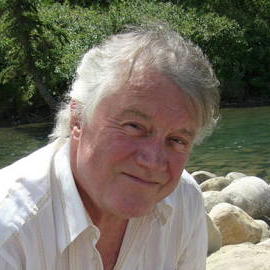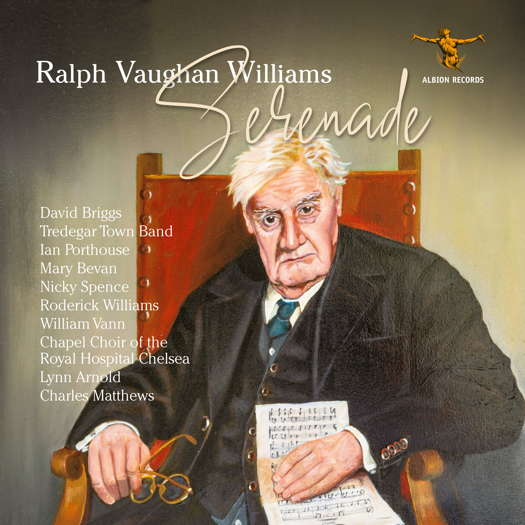 SPONSORED: The Many Hats of Allan Rae - A Birthday Greeting, by Endre Anaru.
SPONSORED: The Many Hats of Allan Rae - A Birthday Greeting, by Endre Anaru.
All sponsored features >>
- seventh century
- Richard Gill
- Royal Opera
- Genoa
- Dortmund Opera
- Bruch: Violin Concerto No 1
- Ensemble Intercontemporain
- Stephen Sondheim Trust
 VIDEO INTERVIEW: Ona Jarmalavičiūtė talks to American choral conductor Donald Nally, director of The Crossing, in this fascinating, illustrated, one hour programme.
VIDEO INTERVIEW: Ona Jarmalavičiūtė talks to American choral conductor Donald Nally, director of The Crossing, in this fascinating, illustrated, one hour programme.

An Enticing Collection
GERALD FENECH listens to a new and unusual album of music by Ralph Vaughan Williams, released today on the composer's 150th birthday
'... superbly crafted little miniatures ...'
Ralph Vaughan Williams is one of the most important English composers of the twentieth century. Drawing on the influence of English folk song and Tudor polyphony, Ralph succeeded at reviving British music during a career that spanned over six decades. He was born on 12 October 1872 - exactly 150 years ago today. His interest in music began at an early age, when, in addition to playing the violin, viola, piano and organ, he became increasingly interested in composition. He studied alongside Gustav Holst at the Royal College of Music, then for three years at Trinity College, Cambridge, where he was a pupil of Parry, Stanford and Charles Wood. Ralph's early work was influenced by his dissatisfaction with the English music scene. He decided to draw on native resources rather than turning to foreign influences, therefore English folksong became a pivotal part of his compositional work.
Vaughan Williams' first big public success came in 1910 at the premiere of his Fantasia on a Theme by Thomas Tallis, before achieving greater fame for A London Symphony (1914). During the First World War the composer, out of his own free will, volunteered into army life until the armistice, when he was appointed director of music for the First Army of the British Expeditionary Force. In 1919, Vaughan Williams had returned to the Royal College of Music as a member of the teaching staff and soon became conductor of the Bach Choir and the Handel Society. In 1942, when he celebrated his seventieth birthday, he was completing his Fifth Symphony, which some regarded as a summing up of his career. But Vaughan Williams was in no mood for farewells. Indeed, since 1940, the composer had been enjoying the novelty of film music, and the Sinfonia Antartica (No 7) of 1952-53 was a reworking of music for the film Scott of the Antarctic.
During the last fifteen years of his life, composition was prolific: four symphonies, the opera The Pilgrim's Progress produced at Covent Garden in 1951, choral works and concertos, a violin sonata and several songs. In addition, he went to the United States to give lectures, and continued to conduct at the annual Leith Hill Festival and elsewhere. He attended concerts, plays or operas almost every night of his life up to its sudden end on 26 August 1958.
Vaughan Williams is today mainly remembered as the pioneering spirit of English music in the twentieth century and an inspiring encourager of the young, apart from his superb music, of course. This CD, released today on Vaughan Williams' 150th birthday, can be considered as a celebration of the composer's dedication to his art. The programme is not made up of the familiar pieces we are used to hearing with regularity, but of works that form an array of stimulating surprises that are still somewhat overlooked.
The album takes its name from Serenade to Music, transcribed here for organ by David Briggs and recorded on the Willis organ of Truro Cathedral. This fine organist also gives us quite an astonishing transformation of the 'March Past of the Kitchen Utensils' from The Wasps.
Listen — Vaughan Williams, arranged by David Briggs:
March Past of the Kitchen Utensils (The Wasps)
(ALBCD 053 track 9, 0:00-0:55) ℗ 2022 Albion Records :
Premiere recordings of a Flourish for Three Trumpets and Four Cambridge Flourishes for Four Trumpets, played by members of Tredegar Town Band, further embellish the programme, and later we hear the whole band in an arrangement of Two Herefordshire Carols made by Paul Hindmarsh using Vaughan Williams' harmonies.
Listen — Vaughan Williams, arranged by Paul Hindmarsh: Two Herefordshire Carols
(ALBCD 053 track 17, 2:03-3:03) ℗ 2022 Albion Records :
There are also three folk songs from this label's Complete Folk Songs series, but these are new recordings specially made for this album where each of the three soloists sing a folk song previously recorded by one of the others.
Listen — Vaughan Williams: The Winter's Gone and Past
(ALBCD 053 track 4, 0:00-0:52) ℗ 2022 Albion Records :
Lynn Arnold and Charles Matthews reprise the early Suite for Four Hands on One Pianoforte, with the original of the Minuet.
Listen — Vaughan Williams: Minuet (Suite for Four Hands on One Pianoforte)
(ALBCD 053 track 11, 0:01-0:40) ℗ 2022 Albion Records :
The latter also goes on to perform organ arrangements of three works by Vaughan Williams.
This enticing collection ends with a hymn tune that the composer named after his cousin and best man, Ralph Wedgwood, known to his friends as Randolph, set to words that Vaughan Williams salvaged from a Moody and Sankey hymn: 'God be With You Till We Meet Again'.
Listen — Vaughan Williams: God be With You Till We Meet Again
(ALBCD 053 track 19, 1:29-2:02) ℗ 2022 Albion Records :
Serenade is a further magnificent contribution to Albion's rich harvest of lesser-known scores and new (and old) arrangements, but, more than this, it is a mixed bag of superbly crafted little miniatures that testify to Vaughan Williams' consummate compositional insight, whatever the genre he was writing for. Passionately performed, sumptuously recorded, meticulously annotated and gorgeously presented - this is the perfect disc to start this particular series. If you are already on the way, there should be no hesitation in acquiring it without further delay.
Copyright © 12 October 2022
Gerald Fenech,
Gzira, Malta

CD INFORMATION - RALPH VAUGHAN WILLIAMS: SERENADE


